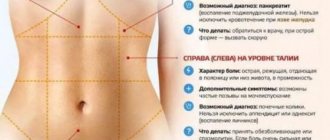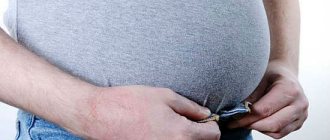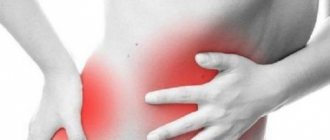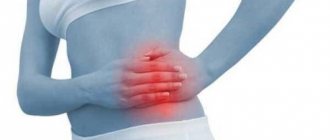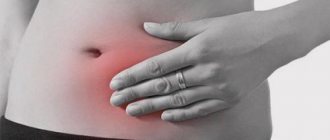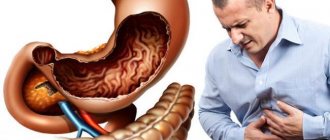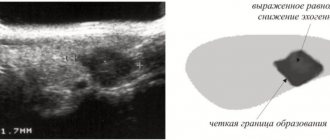Abdominal discomfort often occurs when eating heavy, fatty foods, after overeating, or can be caused by physical activity. If there are no organic disorders and functional disorders of the digestive system, then discomfort does not appear after every meal and passes within a short time, while its intensity does not increase.
Many diseases of the gastrointestinal tract at the initial stage are manifested only by abdominal pain and dyspeptic disorders, so you should not attribute everything to indigestion, you need to consult a doctor.
An accurate description of the location of pain and its nature will help the specialist determine a preliminary diagnosis and prescribe the necessary studies to confirm it. Thus, abdominal pain to the right of the navel may appear due to dysfunction of the intestines, stomach, spleen, appendix, reproductive and excretory system organs.
If there is severe pain in the umbilical region and tension in the abdominal wall, this indicates a surgical pathology.
Determining the cause of pain by symptoms
The table was compiled by Victoria Druzhikina, a practicing therapist on the AskVracha website, and serves as the most reliable source of information when determining the cause of pain.
| Disease | Symptom | Drugs used |
| Acute cholecystitis | Acute, severe pain radiating downwards, nausea, vomiting, fever, loose stools. | Antispasmodics (Duspatalin, No-shpa, Papaverine); Antibiotics (Ciprofloxacin, Amikacin, Meropenem); Analgesics (Diclofenac, Ketorol); Antacids (Famotidine, Omeprazole, Rabeprazole). |
| Chronic cholecystitis | Most often dull, aching, paroxysmal pain, intensifying after fatty foods, rarely - pronounced, loose stools. | Antispasmodics (“Duspatalin”, “No-shpa”, “Papaverine”); Antibiotics (“Ciprofloxacin”, “Amikacin”, “Meropenem”); Analgesics (“Diclofenac”, “Ketorol”); Antacids (Famotidine, Omeprazole, Rabeprazole). |
| ZhKB | Sharp, cutting pain, nausea, vomiting, yellowing of the skin, loose stools" | Antispasmodics (“Duspatalin”, “No-shpa”, “Papaverine”); Antibiotics (“Ciprofloxacin”, “Amikacin”, “Meropenem”); Analgesics (“Diclofenac”, “Ketorol”); Antacids (Famotidine, Omeprazole, Rabeprazole), surgery |
| Hepatitis | The pain is strong, but dull, and may be nagging. Nausea, vomiting, fever, loose stools, weakness, sweating. | Specific antiviral therapy. |
| Cirrhosis of the liver | Dull, in the final stage severe pain, ascites (fluid in the abdominal cavity, looks like a bulging belly), yellow-brown tongue, weakness, nausea, vomiting, loose stools, heaviness in the right side. The protruding edge of the liver is often visible from under the ribs. In the final stage, the organ shrinks and stops protruding. | Hepatoprotectors (“Heptral”, “Ursosan”, “Ornithi”n, milk thistle extract); Proton pump inhibitors (Omeprazole, Rabeprazole, Esomeprazole); Anticholinergic drugs (Mebeverine, Trimebutine). |
| Appendicitis | Many faces - pains are sharp, dull, strong, weak, from the navel to the level of the sternum. Nausea, single vomiting. Fever. Loose stools. Mixing of pain from the epigastrium to the right iliac region after 3–4 hours from the onset (Kocher’s symptom). | Surgery |
| Enteritis, colitis | Pain along the intestines, rumbling in the abdomen, bloating, blood and mucus in the stool. The stool is irregular, liquid. | Antispasmodics (“No-shpa”, “Papaverine”); Antidiarrheal ("Smecta") |
| Bowel cancer | The pain is aching at first, then severe. Constipation, obstruction, weight loss. | Surgical treatment, chemotherapy, radiation |
| Nephroptosis | The pain is often associated with sudden movements, especially high jumps. Varying intensity, usually medium. | Kinesiology. Osteopathy. Surgical correction – kidney suturing |
| Osteochondrosis | The pain comes from the spine and intensifies with movement, inhalation, and coughing. At rest I subside or decrease. | NSAIDs (“Meloxicam”, “Xefocam”, “Diclofenac”, “Aertal”); Muscle relaxants (“Sirdalud”, “Mydocalm”); Chondroprotectors (“Teraflex”, “Dona”, “Arthra”); B vitamins (“Neurobion”, “Combilipen”, “Milgamma”). |
| Endometriosis | The pain is quite intense and is accompanied by cycle disruption and bleeding. | Surgery; Hormonal drugs. |
| Bruise, injury | Pain is associated with a fall, blow, etc., and is limited by this impact. Intensifies with pressure. Accompanied by the formation of a hematoma and bruise. | NSAIDs (Meloxicam, Xefocam, Diclofenac). |
| Myositis | Pain in the muscle, intensifies with pressure and movement. Quite noticeable, subsides when resting. | NSAIDs (“Meloxicam”, “Xefocam”, “Diclofenac”, “Aertal”); Muscle relaxants (“Sirdalud”, “Mydocalm”); |
Lesions and gallbladder
The liver and gallbladder are critically important internal human organs. Even the slightest disruption to their work can lead to serious consequences. Regular nagging pain in the right side at waist level may indicate that a pathology of these organs is developing.
Cholecystitis (Inflammatory process in the gallbladder)
It is usually a natural complication of developed gallstone disease and is associated with a disruption of the organ’s ecosystem. In most cases, cholecystitis develops in the presence of stones in the gall bladder. The inflammatory process develops rapidly in the acute form and relatively sluggishly in the chronic form.
Treatment of cholecystitis against the background of cholelithiasis is carried out by a surgeon, without cholelithiasis - by a therapist or gastroenterologist.
In the photo: the formation of stones in the gall bladder
Cholelithiasis
Mineralization processes in the gallbladder lead to the appearance of stones and inflammation. Organ tissues turn yellow
If the formed stones block the free flow of bile, then acute pain appears in the side. If the condition worsens, you must call an ambulance.
There is a wide range of drugs available for drug therapy. These include ursodeoxycholic acid (UDCA) and its generics. In cases where the outlet for bile is blocked, the stone has gone into the duct, surgical intervention is performed to remove the stones. A surgeon treats diseases.
Hepatitis
Hepatitis A, B and C are infectious acute diseases that can lead to significant problems and subsequent complications. Often, pain in the right side is a potential symptom of the disease.
In addition to pain, fever, weakness, aching joints, and an increase in the size and weight of the spleen and liver are possible. For conservative treatment use:
- for hepatitis C, direct-acting antiviral drugs;
- for hepatitis B nucleotides/nucleosides;
- for A and B – vaccination;
- it is possible to use vitamin complexes and hepatoprotectors.
If the symptoms are similar, a general practitioner will be able to identify the disease and prescribe therapy.
Cirrhosis of the liver
Any pain at the waist level should be taken seriously. At waist level are the major vital organs, including the liver. Rapid acute intoxication of the organ and prolonged exposure to toxins can lead to tissue destruction and cirrhosis.
The disease quickly becomes chronic and the damage becomes irreversible. Therapy comes down to maintaining the function of the organ using all possible medications. If you suspect liver pathology, you can consult a hepatologist.
Irritable bowel syndrome (IBS)
This condition is not associated with changes in the structure of organs and systems. However, pain with irritable bowel syndrome is almost always observed and is a common symptom overall. Women usually suffer from IBS more often than men. Pain (from moderate to severe) can cover the lower abdomen, including the right side, but is most often localized on the left9. IBS often develops against the background of psychoemotional disorders10.
Symptoms of the disease usually subside in the evening and do not bother patients at night. The pain in some cases spreads to the upper abdomen, radiating to the rectum and epigastric region9-11. An important role in the formation of complaints is played by impaired intestinal motility, accompanied by spasm. As part of complex therapy for IBS, antispasmodics (for example, No-shpu® and No-shpu® forte) can be used, which helps reduce pain7, 12, 22.
Gastrointestinal pathologies
The main parts of the gastrointestinal tract system are located in the abdominal cavity, and therefore they often become the cause of pain syndromes
Inflammation of the appendix (Appendicitis)
In scientific circles, appendicitis is an inflammatory process with a focus in the appendix with the accumulation of pus inside the appendix at the narrowed bottom. This can not only cause pain in the right side at the waist level, but also many other unpleasant symptoms.
The disease develops rapidly, and acute forms are fraught with fatal outcomes. Localization of pain in the right side or bottom is sometimes caused by pylephlebitis (this is an inflammatory process involving the portal vein, which leads to direct damage to the liver).
A consultation with a surgeon will help confirm suspicions of appendicitis.
Intestinal inflammation
Disruption of the microflora, bacterial and viral invasions, as well as the entry of foreign objects into the intestines provoke inflammation. The disease is accompanied by defecation disorders, the appearance of stool mixed with mucus or blood, flatulence and pain of various types.
For treatment, if necessary, antibiotics of different groups are used, depending on the disease (Enterofuril, Oleandomycin, Amoxicillin, etc.).
Oncological diseases of the intestine
Nowadays, cancer is detected quite early. Colonoscopy and MRI can identify suspicious clusters of cells and quickly reveal their nature. If you notice symptoms (pain, change in color of stool, defecation disorders), you should immediately consult a doctor.
The therapeutic plan is developed depending on the stage of the cancer. It is possible to use chemotherapy or surgical removal of malignant tissue. Read about polyps in the intestines here.
Cholecystitis
This disease is associated with a delay in the outflow of bile from the gallbladder along the biliary tract. Sharp pain from the right hypochondrium may indicate an attack of cholecystitis. More often this happens at night.
The muscle tone of the bladder increases, provoking its numerous contractions. The patient feels sharp and severe pain. The pain is usually short-lived, but the person experiences stress that turns into neuroses.
The disease develops as a result of cholelithiasis, slowly moving from the acute form to the chronic stage. The walls of the bladder are damaged due to the pressure of stones on it, thicken and become covered with ulcers, which subsequently scar. Stagnation of bile occurs, accompanied by:
- Mild pain
- Nausea
- Bloating
- Vomiting
The pain may worsen when eating fatty or fried foods.
Diseases of the spine and kidneys
Painful sensations are not always associated with problems with the liver or gastrointestinal tract. Problems with the spine and osteochondrosis often cause similar symptoms. A neurologist treats osteochondrosis.
Nephroptosis
Nephropotosis – prolapse of the kidney. Mobile kidney syndrome is often accompanied by pain at the waist level.
The disease is divided into three levels (degrees). Nephroptosis appears on the right side more often, and also becomes obvious in the second stage, when the kidney is easily palpable through the skin at waist level in non-obese patients.
Pain in the right side may be an early symptom of the development of level 1 nephroptosis, and therefore pain should not be ignored. Various techniques are used for diagnosis:
- Carrying out complete blood biochemistry;
- Study of the state of biological fluids;
- Ultrasound scan at waist level;
- X-ray scanning.
Conservative forms of treatment: wearing a special corrective bandage at the level of the waist or lower abdominal area, exercise therapy and exercises. Surgery is rarely prescribed. The treatment of kidney diseases in women is described here.
Osteochondrosis and hernia
Discomfort and pain are often associated with nerve compression or inflammation of the skeletal muscles. A characteristic symptom is loss of flexibility, as well as increased discomfort with sudden movements or even breathing.
To relieve some symptoms, medications are prescribed to reduce inflammation, as well as exercise therapy and physiotherapy. Find out about the symptoms of hernia in men from this article.
Doctor's advice
Shingles. The pain of herpes zoster before the appearance of characteristic rashes in the form of blisters along the nerve can be so severe that they are mistaken for a heart attack or renal colic. Having excluded all conditions using examination, laboratory (general and biochemical blood tests, general urine analysis) and instrumental (ECG, ultrasound, MRI) research methods, herpes can be assumed.
Victoria Druzhikina Neurologist, Therapist
Pinched nerve
Hepatic colic
A symptom of hepatic colic may be aching pain in the left side.
Aching pain on the right is characteristic of liver diseases. This condition is preceded by minor pain, which most patients do not attach importance to. All liver diseases in the initial stages are asymptomatic. For example, hepatitis does not manifest itself in any way; pain appears only when the virus is active. The patient appears:
- Prostration
- Loss of performance
- The skin and whites of the eyes become yellowish
In the future, if this disease is not treated, aching pain will be added to these symptoms.
Pain in the lower abdomen in women
The lower abdomen may hurt for the same reasons as the side. Pain in the right side of the lower abdomen in women is often a manifestation of the following pathologies: inflammation of the uterine appendages, less often – ovarian cysts and the primary stages of uterine fibroids. The lower abdomen is the main part of the abdominal cavity, but pain can be caused by pathologies of surrounding organs and tissues. Very often, the lower abdomen hurts due to complications of pathologies of the reproductive organs. What are the causes of discomfort in the lower abdomen?
Endometriosis
This is a common disease that often develops in healthy women and mainly affects people of reproductive age. The endometrial tissue (uterine wall) begins to grow and spread into the surrounding tissue. This causes pain in the lower abdomen.
There are two main types of endometriosis: Genital. In this case, endometrial cells are localized in the uterus and ovaries. Extragenital. In this situation, the growth can affect the entire lower abdomen, and the inflammatory process affects the intestines and navel. Based on the nature and severity of the disease, the disease is divided into 4 degrees. Laparoscopy is recognized as the only effective diagnostic method. This is an “exploratory” surgical operation that is performed through an opening in the lower abdominal cavity.
Treatment is with hormonal drugs, painkillers and anti-inflammatory drugs. In some cases, surgical intervention is necessary. If the right side of the lower abdomen hurts in women, this is very often a manifestation of complications in the reproductive system. Other possible causes of lower abdominal pain are described here. If you have similar symptoms, you can see a gynecologist online.
What organs are located in a man's right side?
Pain in the lower abdomen on the right due to malfunction:
- gallbladder;
- prostate;
- liver;
- large and small intestines;
- pancreas;
- stomach;
- organs of the urinary system.
Unexpected, sharp, acute pain is possible due to injury to internal organs, which happens with appendicitis, movement of stones in the kidneys, inflammation of the peritoneum, and intestinal obstruction. In case of sluggish inflammatory processes, for example, with pyelonephritis, prostatitis, colitis, a gradual increase in pain is observed. Pulsating severe pain begins with dysfunctions that are accompanied by intracavitary pressure above normal.
Diagnostic methods
| Cause of pain in right side | Diagnostic methods |
| Liver diseases | OAM, OAC, Blood biochemistry, CT, MRI, ultrasound. |
| Appendicitis | CBC with leukocyte formula, OAM, ultrasound |
| Nephroptosis and kidney disease | OAM, UAC, Blood biochemistry, CT, ultrasound. |
| Diseases of the female reproductive system | OAM, OBC, Blood biochemistry, CT, MRI, Ultrasound, Laparoscopy. |
| Bruises and injuries | Visual examination, history, palpation. |
| Diseases of the gastrointestinal tract | OAM, OBC, Blood biochemistry, CT, MRI, Ultrasound, Colonoscopy, |
Ulcer
A stomach ulcer can cause pain in the right hypochondrium.
Duodenal ulcer causes regular stabbing pain in the right hypochondrium. This pain is so acute that it is called dagger-like. It occurs mainly at night and continues until food enters the intestines. In addition to pain, the patient may experience:
- Bloating
- Nausea
- Heaviness
- Deterioration in general health
Frequently asked questions and doctor's answer
General practitioner Victoria Druzhikina answered questions
Pain in the right side at the level of the lateral ribs - “The most common options for such symptoms are pancreatitis, cholecystitis, osteochondrosis, cholelithiasis, hepatitis. Everything except osteochondrosis can be diagnosed using ultrasound of the abdominal organs. Problems with the spine are confirmed using an MRI or x-ray of the area concerned.”
Pain in the right side from the back - “Pain radiates to the back with the following diseases: pancreatitis, pyelonephritis, osteochondrosis, cholelithiasis, pancreatic cancer, ulcer. Damage to the pancreas is characterized by girdle pain.”
Pain in the right side at the waist level in front in women - “Inflammatory bowel diseases, endometriosis, myositis manifest themselves with just such symptoms. With intestinal pathology, the stool will be disturbed - liquid, frequent, with admixtures of mucus or blood. Endometriosis is accompanied by bleeding and cycle disruption. Myositis occurs only with local symptoms. For pain in women, consultation with a gynecologist is indicated.”
Pain in the right side at the waist level in front in men - “With such pain, one can suspect osteochondrosis, inflammatory bowel disease, myositis. Examination and palpation give a lot - a tense, painful muscle with myositis, a rumbling painful stomach, limited mobility of the spine due to pain with osteochondrosis will help to suggest a pathology and refer for further examination (ultrasound of the kidneys, X-ray or MRI of the spine, general blood and urine tests, stool analysis and etc.)."
Pain in the right side under the ribs radiates to the back - “Symptoms can be observed with osteochondrosis, pancreatitis, cholecystitis, cholelithiasis. All conditions require medical evaluation and care. Hospitalization may be indicated."
Differences in men and women: diseases by gender type - “The cause of pain in the right side differs depending on gender. Women may have pathologies of the reproductive system - endometriosis, inflammation of the ovaries or their appendages. Men are more likely to have liver problems and osteochondrosis.”
When to see a doctor
Pain at the waist or lower abdominal region indicates the development of hidden pathologies affecting various internal organs (in the absence of injuries or bruises), and therefore, when this symptom appears, it is necessary to visit a doctor for an initial examination and diagnostic measures. The waist level is the location of vital organs and tissues that are vulnerable to a wide range of infectious, bacterial and genetic diseases. Even after an ordinary injury, if you have abdominal pain at the waist level, it is better to go to the doctor for a consultation.
Visit a doctor at the first symptoms. Pain in the side at waist level should absolutely not be ignored. This is an alarm bell that should immediately make you “scurry around” and get ready to go to the hospital. Never put off visiting a doctor. Timely detection of the disease is the key to recovery.
This article has been verified by a current qualified physician, Victoria Druzhikina, and can be considered a reliable source of information for site users.
Rate how helpful this article was
4.2 63 people voted, average rating 4.2
Did you like the article? Save it to your wall so you don’t lose it!
Treatment
Treatment tactics depend on the established diagnosis. Self-medication is fraught with deterioration in health and is sometimes associated with a risk to life. It is necessary to call an ambulance in several cases.
- Acute abdominal pain that does not go away within several hours.
- Within 1 hour after taking the antispasmodic, the pain does not stop or intensifies.
- Painful sensations are accompanied by fever, repeated/bloody vomiting, black feces or the presence of scarlet blood in the stool, and bleeding from the vagina.
- Pain in the abdomen develops against the background of a sharp deterioration in the patient’s condition.
- The abdomen has become hard (abdominal wall tension).
- Abdominal pain in a pregnant woman.
Make an appointment at the First Family Clinic of St. Petersburg if you are bothered by constant or recurrent abdominal pain of moderate intensity, in cases of deterioration or lack of therapeutic effect for a previously diagnosed disease.
Treatment tactics for abdominal pain on the right
- Gastrointestinal diseases - antispasmodics, antacids and antiulcer drugs, laxatives (for constipation), anti-inflammatory drugs and antibiotics (for inflammation, intestinal infections).
- Urogenital pathology and kidney diseases - antibacterial therapy, often requiring IV infusions to eliminate intoxication.
- Acute surgical pathology (appendicitis, ectopic pregnancy, intestinal obstruction) is an urgent operation.
The best solution, even if you have minor abdominal pain and no other symptoms, is to make an appointment with your doctor. Timely medical care will prevent the pathological process from worsening and often allows surgery to be avoided. Therapists, gastroenterologists and other specialized specialists at the First Family Clinic of St. Petersburg will prescribe only the necessary tests, quickly determine the exact cause of the pain and prescribe effective treatment. For a quick recovery, follow your doctor’s recommendations on the dosage and duration of taking medications, diet, and adhere to a healthy work and rest schedule.
